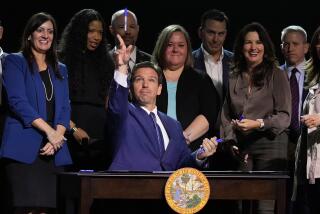Church Drops Plan to Sail Pilgrims to Cuba to See Pope
- Share via
MIAMI — The Archdiocese of Miami had its own Titanic-like experience Friday when a tidal wave of anti-Castro sentiment from the exile community here sank the church’s big plans to sail a luxury ship filled with Catholic pilgrims to Cuba for next month’s visit by Pope John Paul II.
“It is now evident to me that the cruise ship has become a source of serious tension in our community,” Miami Archbishop John C. Favalora said, explaining why he was canceling the trip.
In place of the Norwegian Majesty, chartered at a cost of $800,000, an archdiocese spokeswoman said, the church will now try to hire a plane to carry to Havana the pilgrims who had signed up for the cruise, including Cardinal Roger M. Mahony of Los Angeles.
Favalora’s decision came just 24 hours after he met with prominent Latino Catholics--bankers, lawyers and business executives--who expressed concern that Cuban President Fidel Castro would use the visit of an American-based ocean liner to score a symbolic victory in the decades-long battle between exiles here and the Communist regime.
“The arrival of a luxury liner in Havana would have sent a message of normalcy, when the fact is that there are Cubans dying in the Florida Straits, trying to escape in makeshift rafts,” said Rafael Penalver, a lawyer and one of the Cuban American leaders who met with Favalora and his three auxiliary bishops Thursday. “What we do not want is for Castro to send a false propaganda message to the world.”
Penalver, who is active in civic and Catholic affairs, said the church’s decision to charter the 1,000-passenger vessel was “insensitive to exiles” and was made with insufficient consultation with Cuban Americans. “We’re very pleased that the archbishop has listened and taken our concerns into account,” he added.
Because of a 35-year U.S. trade embargo and a prohibition on travel to Cuba from the United States, the archdiocese’s plan to sail directly to Havana had to be approved by the State Department. To avoid spending money in Cuba in violation of the embargo, those aboard were to eat and sleep on the ship.
*
In granting approval for the cruise, a State Department spokesman said the “U.S. government views the pope’s visit as a potentially important event in bringing to the Cuban people a message of hope and the need for respect of human rights.”
But church leaders may have misjudged the willingness of exiles--even though most are devout Catholics and admirers of the pope--to accept any act that could be seen as an endorsement of the legitimacy of the Castro government.
“I think it’s a tremendous mistake to cancel the cruise,” said Eduardo Gamarra, a Latin American studies professor at Florida International University. “In authoritarian regimes, transitions have often followed catalytic events. A cruise ship in Havana harbor could have been a catalytic event, and the potential of that for change outweighs any benefit Castro might have gotten.”
Mahony, in Portland, Ore., for the installation of a new archbishop there, could not be reached for comment. There are other air charters, arranged by the Catholic church, scheduled from New York and Boston for the papal visit.
In Miami, home to about 1 million Cuban Americans, the church-organized Cuba voyage had been controversial and divisive from the time it was announced in October, even though the church emphasized its spiritual nature. “Even though we removed all the casinos, the shows, the alcohol, it still had the image of a fun ship,” said the Rev. Tomas Marin, archdiocese chancellor.
Although each year thousands of Cuban Americans obtain special visas to travel to the island to visit relatives, and thousands more enter as tourists on flights from Mexico and the Bahamas, most exiles respect the U.S. embargo on tourism and trade with Cuba.
And most are loath to do anything that would tend to aid the Castro regime.
*
The travel agency booking passage for pilgrims--whose Catholic bona fides had to be attested to by their local parish--received threats. Miami Bishop Agustin Roman, a popular Cuban-born church leader, announced that he would not take part. Cuban-born Rep. Ileana Ros-Lehtinen (R-Fla.) urged Miamians to stay home and listen to the pope on the radio.
Earlier this month, thousands opposing the cruise marched through the heart of Little Havana, some carrying signs that read, “Want to see the pope? Go to Rome.”
With Spanish-language radio commentators and influential exile groups like the Cuban American National Foundation assailing the trip, relatively few Cuban Americans in Miami had signed up for the journey; as of this week, only about 400 people had made reservations for the four-day travel, at prices ranging from $900 to $1,400. Most were non-Hispanics from elsewhere in the U.S. Refunds will be offered, a church spokeswoman said.
Church officials said plans to use a ship to carry the faithful to Havana, where the pope is to conduct a Jan. 25 Mass during his five-day visit, stemmed from an invitation from the Cuban church, which has been enjoying a rebirth since Castro eased restrictions on worship, including a one-time allowance this year of Christmas festivities.
Many Cuban exiles have expressed hope that the pontiff’s first visit to the island will accelerate a transition to democracy there.
Castro foes here have held protests and threatened economic boycotts. Hard-liners in the exile community have enforced a rigid view on Cuba and have had considerable sway on U.S. foreign policy.
Times staff writer Larry Stammer in Los Angeles contributed to this report.
More to Read
Sign up for Essential California
The most important California stories and recommendations in your inbox every morning.
You may occasionally receive promotional content from the Los Angeles Times.













